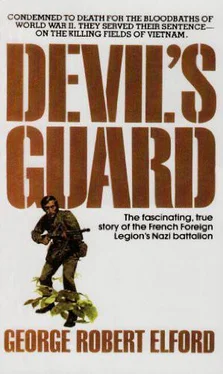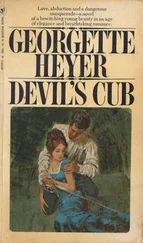Van Ho smiled. “We know that our villages are much too backward for you to enjoy. You live in big cities like Paris, Marseilles, or Lyons.”
“Or Berlin,” commented Riedl.
Van Ho seemed surprised. “Berlin is in Germany, so I have learned,” he blurted out.
“You learned it where?” Erich asked.
I thought it was a most extraordinary encounter—a local ricepicker in the middle of nowhere knowing about Berlin. So after all the natives were not so savage as the French insisted they were.
“When I was a child I attended the missionary school at Yen Bay,” Van Ho explained. “The missionaries taught us many wisdoms, including geography.”
He paused for a second, then asked with some restraint, “Are you the Germans of the Foreign Legion?” His barely perceptible hesitation before saying “Germans” brought another grin to Erich’s face.
“I bet he wanted to say ‘Nazis’,” he remarked in German and I saw that Van Ho looked up sharply when he heard that word. It must have been familiar to him. “Bien ser,” Schulze answered. “We are the Germans, the Nazi wolves, the man-eaters, the angels of death, the unceasing fighters.”
“I haven’t said that you are wolves and man-eaters,” the man protested, showing fright for the first time.
“Why not? That’s what we are,” Schulze teased him. “Have they not told you so?”
“Who should have told us?”
“The commissars.”
“We are not guerrillas,” Van Ho protested vehemently.
“I have not said you were.”
There was a pause and a sense of restlessness in the group. “May I ask you something?” Van Ho spoke finally.
“Go ahead,” I said.
“Why are you fighting?” he asked.
“Your people won’t let us retire,” Krebitz told him with a chuckle.
“It is your own choosing, for this is not your war,” Van Ho insisted.
“Correct,” Schulze agreed. “This is not our war. It is everyone’s war—France’s, England’s, America’s, and maybe even Sweden’s or Japan’s, but they have yet to realize it.”
Van Ho shook his head. “I do not understand your mentality. Truly I do not.”
“We are complicated people.”
said Krebitz. “No one seems to understand our problems.”
“Maybe you are very warlike,” nodded Van Ho. “The SS—” He cut off as soon as that word slipped out.
“That’s right!” Erich roared. “SS tradition, mon ami, sheer SS tradition. By the way where did you learn about the SS, Monsieur Van Ho Tien, also in the missionary school?”
“I read some books about the war.”
“What did you read about the SS?”
“They were much feared during the war.”
“You are being very polite,” Schulze chuckled. “You ought to have read a lot more about the SS than that.”
Then shouldering his submachine gun he added, “You are a clever man, Monsieur Van Ho Tien. I think you deserve a better job than picking rice—or,” he concluded, stressing his words, “maybe you do have a better job and work in the paddies only part-time.”
He strolled over to the pile-supported shelter, lifted some bags casually, examined a few nearby baskets, then turned. “What do you think of the Viet Minh, Monsieur Van Ho?”
“I feel neither love nor hatred for them. We live far away from the war and we are happy that it is so.”
“It cannot be as idyllic as that. Your village is in the center of a very important Viet Minh-dominated province, isn’t that so?” I realized that Erich was playing hide-and-seek with the man and began to wonder what might have awakened his suspicion.
“How about your feelings for the French colonialists?” Schulze pressed on.
“Do you want me to be frank with you, officer?” Van Ho asked with a sour smile.
“Naturellement,” Erich nodded. “We can take any amount of truth, however painful, and no one will start shooting.”
“We have lived here for centuries. The French came to our country only recently. We regard them as passing visitors who will depart one day like the Japanese departed.”
“But how about us Germans?” Schulze persisted.
“We think you are capable of only one human feeling, officer, and that is hatred,” Van Ho exhaled with defiance.
“Well, aren’t we being complimented?” Krebitz remarked. “What do you think we should learn in this bloody country? Love for our treacherous, slimy, poison-spitting, lying fellow human beings?”
“Who told you that we can only hate?” Schulze went on, ignoring Rudolfs outburst.
“The books,” Van Ho stated.
“Printed in Moscow? Or in Peking?”
“No, officer,” Van Ho shook his head. “I can read neither Russian nor Chinese—only French. And the books which I read about you were all printed in France… the country you are fighting for. They call you murderous wolves yet you are serving them. Why?”
“They pay well,” Riedl cut in.
“Are you fighting only for money?” Van Ho wondered. “Even the Viet Minh has more money than the French.”
“Bien ser,” said Erich. “We know that lately Giap has a pile of American dollars to get rid of. Maybe you can arrange a better deal for us with the Viet Minh.”
“You will have to find the Viet Minh yourselves,” the man evaded Erich’s flimsy trap.
“Monsieur Van Ho,” Schulze said with quiet persuasion, “your village must have been visited by some Viet Minh commissars.”
“There is no village which the commissars have not visited, officer. They go everywhere. Some people listen to them, others won’t.”
“I am willing to grant you that, but as far as your former remark goes, we do not hate your people. We hate only the Communists—and with good reason.”
“Our people are not Communists,” Van Ho exclaimed. “The majority of them do not even know what the word stands for.”
“It is something you should tell to Ho Chi Minh. He does not seem to be aware of it.”
Erich turned his face toward me and added in German, “Hans, if this one here isn’t a political commissar himself, I’ll eat my gun—barrel, stock, ammo, and all. The crop in their baskets is dry. They haven’t cut it today.”
Erich was always a keen observer.
Van Ho spoke. “May we return to our work?” he said, obviously disturbed by our low-keyed conversation. Erich slowly turned toward him and asked, “Would you mind if we look around a bit before you leave?”
“No, we won’t mind. You will do that anyway. Whenever the army comes by our place we are submitted to searches and other indignities.”
He raised his arms to accommodate my troopers, who frisked him expertly. There was visible consternation among the women. “Are you going to search them, too?” Van Ho asked with barely concealed hostility.
“Don’t worry,” Schulze said reassuringly, “no one is going to paw them. We have a couple of female assistants.”
He was about to send a trooper to fetch Suoi and the nurses when Krebitz stopped him. “Hell, why should they tromp all over the ponds, Erich? We should send the wenches to the road.”
”
“You’re right,” Erich nodded. “That’s what we should do.”
The peasants carried nothing suspicious, nothing forbidden. We combed through the area; examined the shelter, the bags, the baskets, the underpart of the platform, the roof—nothing incriminating was discovered.
“What do you think of them?” I asked Xuey, who had kept silent during our entire dialogue with Van Ho Tien but was listening with eager interest in his narrow, dark eyes.
“They belong to the local Viet Minh cell and they do have weapons,” Xuey stated with firm conviction. “No people of their age would be picking rice—not in this province.”
Читать дальше












